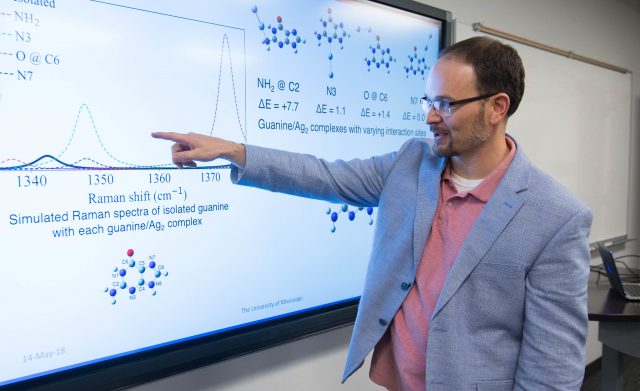
Greg Tschumper, professor and chair of chemistry and biochemistry, has been awarded the university’s Distinguished Research and Creative Achievement Award for 2021. Photo by Kevin Bain/Ole Miss Digital Imaging Services
OXFORD, Miss. – A big year just got much bigger for Greg Tschumper.
The University of Mississippi chair and professor of chemistry and biochemistry was named the winner of the university’s Distinguished Research and Creative Achievement Award on Friday (April 30) during the spring faculty meeting.
Created in 2008, the award is the university’s highest honor for faculty success and outstanding accomplishment in research, scholarship and creative activity.
“I am deeply honored to have been selected for this award,” said Tschumper, who joined the UM faculty in 2001. “We have so many stellar faculty at the University of Mississippi engaged in world-class research and scholarship.
“First and foremost, I need to thank my incredible family. I would not have been able to achieve anything like this without the support and inspiration that my wife, Emily Tschumper, and daughters, Anne and Kate, provide every day. I must also thank all of the amazing undergraduate and graduate students who have worked in my lab over the years. Their bright minds and hard work have been the foundation of my research program at Ole Miss.”
The award follows several recent honors for Tschumper. In 2020, he was elected a full member of Sigma Xi, the scientific research honor society.
Later last year, he was elected as a fellow of the American Association for the Advancement of Science, the world’s largest multidisciplinary scientific society that seeks to advance science, engineering and innovation around the globe.
And earlier this year, he was named the university’s winner of the 2021 SEC Faculty Achievement Award.
“The Distinguished Research and Creative Achievement Award is the highest honor at the university which recognizes excellence and impact in scholarship,” said Josh Gladden, UM vice chancellor for research and sponsored programs. “The work of the committee is always difficult with many nominees deserving recognition.
“Dr. Tschumper has been a leading researcher on our campus for many years and in his role as chair of chemistry has fostered a culture of excellence and impact. We are thrilled to be able to honor his work with this year’s award.”
Tschumper’s research group explores the subtle interactions between molecules, especially those involving water because of its vital role in many physical and chemical processes, either in our bodies or in nature.
His laboratory is devoted to obtaining answers and insight to important chemical problems in essentially every area of chemistry through theory and computation rather than experimentation.
“I usually describe my research as ‘chemistry without chemicals’ because our work utilizes physics, mathematics and high-performance computing rather than laboratory experiments to gain insight into chemistry,” said Tschumper, who also is a member of the American Chemical Society, the World Association of Theoretical and Computational Chemists, and the Mississippi Academy of Sciences.
“Although very fundamental, this research has been quite impactful because of deliberate efforts to draw direct connections to experimental results.”
His research has led to nearly $30 million in external funding for his research lab and research in Mississippi through his leadership roles on grants from the National Science Foundation and other funding agencies.
The results from Tschumper’s lab are being used to better understand and predict the behavior of water under different conditions. Some of the lab’s recent work has been highlighted in ScienceDaily and by the NSF.
“This insight could help improve existing theoretical models for simulating aqueous chemistry, some of which are currently being used on supercomputers around the world to accelerate the discovery of molecules that could lead to therapeutics for COVID-19 or vaccines for new variants of SARS-CoV-2,” Tschumper said.
Outside the Lab
As a teacher, Tschumper also is a leader, guiding students to success either in the classroom or his lab, where he has mentored 65 undergraduate research assistants. For his classroom successes, he was awarded the Cora Lee Graham Award for Outstanding Teacher of Freshmen in 2009 and the Faculty Achievement Award in 2015.
“In the chemistry department at Ole Miss, research with undergraduate and graduate students is intrinsically tied to our teaching mission,” said Tschumper, who is author of 108 peer-reviewed journal publications, including 66 with undergraduate co-authors. “Just as much learning takes place in the research lab as in the classroom.”
The teaching successes of the department are echoed by just a few national accolades that chemistry students have earned in the last year.
In 2020, Jax Dallas, a physical chemistry and mathematics major from Caledonia, and William Meador, a chemistry major from Carbondale, Illinois, were awarded Barry Goldwater Scholarships. The pair were the university’s 15th and 16th winners of Goldwater scholarships, which is one of the oldest and most prestigious national scholarships in the natural sciences, engineering and mathematics.
This year, two more chemistry majors, Qing Ivy Li, of Oxford, and Austin Wallace, of Southaven, became the university’s 17th and 18th Goldwater scholars.

Greg Tschumper and his research group explore the subtle interactions between molecules, especially those involving water, through theory and computation rather than experimentation. Tschumper, named the winner of the university’s 2021 Distinguished Research and Creative Achievement Award, describes the work as ‘chemistry without chemicals.’ Photo by Robert Jordan/Ole Miss Digital Imaging Services
And earlier this month, Dallas and Meador were selected for NSF fellowships that recognize and support the research-based pursuit of master’s and doctoral degrees in STEM fields. The duo, along with biomedical engineering major Larry Stokes, of Clarksdale, was selected for the foundation’s Graduate Research Fellowship Program.
“I am very happy to see growing recognition at the local, regional and national level for the Department of Chemistry and Biochemistry at the University of Mississippi,” said Tschumper, who became chair of the department in January 2017. “Spectacular things can be accomplished when talented students have an opportunity to work with top-notch faculty in both the classroom and the research lab.”
Tschumper knows the importance of students gaining encouragement from mentors. Tschumper grew up on a farm outside of Hokah, Minnesota, where his mother worked in K-12 education as a teacher and administrator for more than 40 years.
“That has certainly been a big influence on my approach to and passion for teaching,” he said. “I also draw a lot of inspiration from some of the amazing professors I’ve had over the years, especially those who challenged their students.”
As a student at Aquinas High School in La Crosse, Wisconsin, Tschumper was inspired by two chemistry teachers: the late Ray Heath and Rodney White.
“I really enjoyed physics and chemistry in high school,” he said. “Neither came to me naturally, but I could eventually understand the material if I just kept working at it, whereas many of my smarter classmates would often give up.
“Growing up on a farm, I learned that you don’t give up just because something is hard, and those lessons about hard work and perseverance are still guiding me today.”
At Winona State University, where he earned a bachelor’s degree in chemistry and mathematics in 1995, Tschumper said he “was influenced by Dr. Bill Ng in chemistry and Dr. Jeff Anderson in mathematics.”
“My first real introduction to theoretical chemistry research came during an NSF-sponsored Research Experiences for Undergraduates program at the University of North Dakota with Dr. Mark Hoffmann,” Tschumper said. “By the end of that summer, I was hooked and knew exactly what I wanted to pursue in graduate school.
“My Ph.D. adviser at the University of Georgia, Dr. Fritz Schaefer, also had a profound impact on my professional trajectory, along with my postdoctoral advisers Dr. Martin Quack at ETH Zürich in Switzerland and the late Dr. Keiji Morokuma at Emory University.”
At Home
Following his postdoctoral fellowships in Switzerland and Emory, Tschumper applied for an assistant professor position at Ole Miss. He had heard positive news about the Department of Chemistry and Biochemistry, and when he came to campus for his interview, he felt at home.
Oxford also has become home for him and his wife, Emily, a clinical assistant professor of pharmacy practice in the School of Pharmacy. The Tschumpers have two daughters: Anne, who finished at Oxford High School in December and will be entering Ole Miss in the fall, and Kate, who is starting at Oxford High in the fall.
Anne is a talented artist with a strong interest in and gift for Asian languages, and Kate is interested in physics, he said.
Tschumper’s fascination with science extends into the family’s household, as one of his joys outside of work is coffee roasting.
“I am a coffee fanatic and have been roasting my own beans for many years,” he said. “There is actually a lot of fascinating chemistry behind the roasting and brewing processes.”
But it’s not all science all the time. Intense music and working out helps Tschumper recharge, and he unwinds by socializing with friends and family.
“I am just lucky to have a fantastic job at a great university,” Tschumper said. “Working hard doesn’t feel like hard work when you love what you do.”
With his selection as the university’s 2021 Distinguished Research and Creative Achievement Award winner, Tschumper joins a growing list of acclaimed faculty recognized for their research, scholarship and creative activity.
Previous winners of the Distinguished Research and Creative Achievement Award are Sam Wang, Larry Walker, Charles Reagan Wilson, Dale Flesher, Atef Elsherbeni, Mahmoud ElSohly, Robert Van Ness, Charles Hussey (who also was chair of chemistry when he received the award), Ikhlas Khan, Alice Clark, Marc Slattery, Ron Rychlak and Michael Repka.
The award recipient is selected from a competitive pool of nominees by the most recent 10 award winners.
